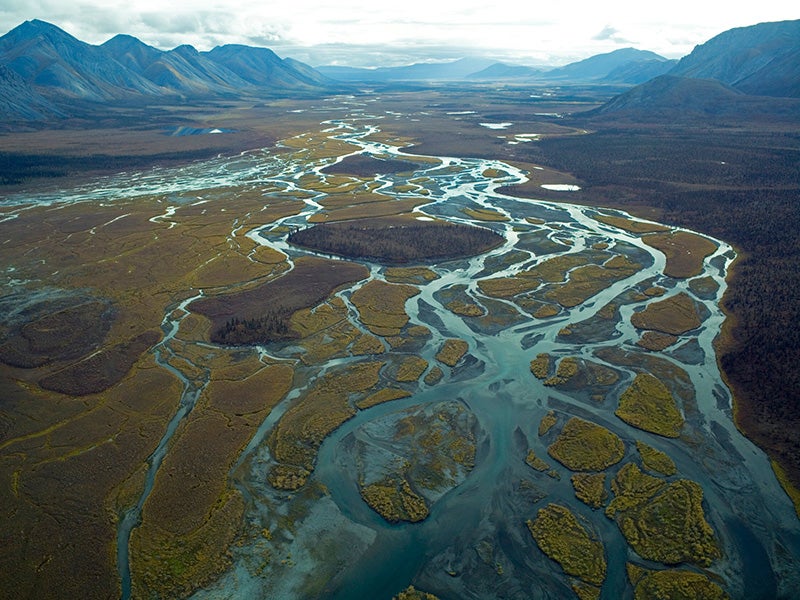Earthjustice Celebrates Cancellation of Arctic Refuge Leases and Proposed Future Actions
Biden administration cancels illegal leases and opens new processes that could preserve cherished Arctic lands in Alaska. More is needed to tackle the biggest climate threat: further oil drilling on existing oil and gas leases in the Western Arctic
Contact
The Biden administration today announced several key protections for the Arctic in Alaska, laying the groundwork for lasting benefits to Indigenous people, threatened wildlife, and a region acutely impacted by climate change. In a long hoped-for victory for the Arctic National Wildlife Refuge, the Department of Interior cancelled oil-and-gas leases issued following a 2021 lease sale that auctioned off lands in the Arctic Refuge Coastal Plain. The 2021 lease sale was the culmination of an unlawful process initiated under the Trump administration to open the Coastal Plain to fossil-fuel development, even though these critically important lands were previously closed to oil drilling for decades.
“We commend Secretary Haaland for canceling unlawfully issued oil-and-gas leases in the Arctic Refuge,” said Abigail Dillen, President of Earthjustice. “This decisive action undoes an egregious attack on this cherished place and will help to vindicate the rights of Indigenous people and protect vital habitat. Looking ahead, we hope to see the strongest possible protections for the Arctic Refuge and the Western Arctic in the years to come.”
As part of its America’s Arctic announcement, the Biden administration also released a Draft Supplemental Environmental Impact Statement for the Coastal Plain Oil and Gas Leasing Program that will guide future land management in the biological heart of the Arctic Refuge. The Refuge is an amazing Arctic treasure that offers habitat for polar bears, grizzlies, musk oxen, wolves, and the Porcupine Caribou Herd, among other iconic Arctic species. Caribou are a primary food source for people of the Gwich’in Nation, who have stewarded Arctic lands for millennia and are culturally and spiritually tied to the herd and the surrounding landscape. This newly released environmental impact statement is an important step toward providing the maximum protections allowed under current law for this unique place rather than allowing it to be sacrificed for industry profits.
Today the Bureau of Land Management also proposed a new set of land-use regulations for the National Petroleum Reserve-Alaska (Reserve), a vast landscape in the northwestern region of Alaska also known as the Western Arctic. The package includes stronger safeguards against new oil and gas leasing and development in designated Special Areas, such as wetlands that serve as essential nesting grounds for migratory birds. These protections are important for preserving cultural uses for Arctic communities, essential habitat, and wildlife dependent on this irreplaceable landscape.
The proposed Reserve regulations are a significant step forward and propose significant new protections to parts of the Western Arctic that have never been leased to the fossil-fuel industry. More is still needed to address climate threats associated with fossil-fuel development on public lands in this region where millions of acres have already been leased to ConocoPhillips and other oil companies. The Western Arctic is the site of the Willow Project, a highly controversial oil-drilling operation that ConocoPhillips broke ground on earlier this year before pausing due to seasonal conditions. Earthjustice has challenged Willow in court, with a decision expected this fall on whether that project can continue. Willow is a hub for future fossil-fuel extraction that could expand outward from the project site. All told, even with these new regulations in place, new drilling in the Western Arctic could result in the extraction of an additional 4.6 billion barrels of oil in the coming years, a dangerous prospect in the face of a worsening global climate crisis.
“It is encouraging to see bold leadership to enhance protection for the Arctic, a place of unparalleled natural beauty that also faces severe challenges from the climate crisis,” said Earthjustice Alaska Attorney Jeremy Lieb. “In the Western Arctic, the proposed regulations that seek to protect globally significant ecological resources in this unique region are an important step. At the same time, more work is needed to address the full impact, including to the climate, of drilling on the millions of acres of the Reserve already leased to oil companies. Millions of Americans have experienced the effects of intense heat this summer — a stark reminder that climate change is here now and stands to get much worse. The Department of the Interior should conduct a full review of the climate impacts of potential fossil-fuel development in the Western Arctic and take action to align Arctic fossil-fuel decisions with federal and global climate commitments.”

Additional Resources
About Earthjustice
Earthjustice is the premier nonprofit environmental law organization. We wield the power of law and the strength of partnership to protect people's health, to preserve magnificent places and wildlife, to advance clean energy, and to combat climate change. We are here because the earth needs a good lawyer.